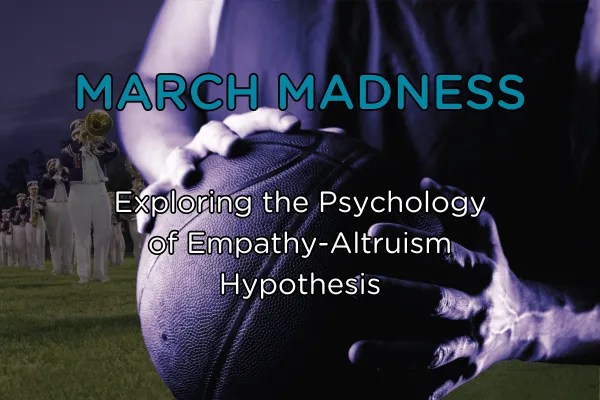General Inquiries: (587) 333-6349 - info@sanostate.com



March Madness: Exploring the Psychology of Empathy-Altruism Hypothesis
“...the smallest gesture of goodwill has the capacity to kindle an unquantifiable change in ourselves and the world...” - Kristen Nash
March Madness is in full swing; every bracket has been busted. Upsets and underdogs have emerged, and multiple games have been won with nail-biting three-point buzzer-beaters. Whether March Madness consumes your thoughts or simply feels like this month’s state of mind, the annual NCAA basketball tournament never disappoints to deliver all the feels to sports enthusiasts and the uninterested alike.
This year is no exception. No. 4 seed Auburn was shocked by No. 13 seed Yale 78-76 in their first-round game in the East Regional. Upsets like this are highly anticipated during the tournament as Cinderella teams skirt elimination with a diet of grit, true determination and a side of confidence.
However, one of the highlights of this particular upset transcends sport. Yale’s marching band couldn’t travel to Friday’s matchup against Auburn. To avoid a sixth-player no-show, an unsuspecting proxy picked up the mantle. Idaho’s Vandal Marching Band donned Yale T-shirts and merch, pumped themself up to play with the veracity for their own, and made the 90-minute drive to Spokane to sub in.
“Everyone was really enthusiastic about covering for the Yale students who couldn’t make it,” Spencer Martin, the University of Idaho’s director of athletic bands, told the News. “Universities help universities, and bands help bands.”
According to American social psychologist Daniel Batson's "empathy-altruism hypothesis," when someone witnesses another in need, they help regardless of what they get from it. A band leader from the University of Idaho saw a need and filled it.
This was much more than a university helping another university. Too often, we limit the positive psychological effects of generosity to those who give and those who receive. Still, the endorphin-releasing sensations flow far beyond these two groups and encompass a substantial third party…witnesses.
What are the psychological effects of giving and selfless behaviour?
Endorphins and hormones like oxytocin, dopamine, and serotonin are released in the brain, producing emotions known as the “helper's high.” When we are charitable, our brain's pleasure-and-reward center lights up as if we were the ones receiving. The euphoria kicks in thanks to the mesolimbic pathway, which spots rewarding stimuli and helps regulate our moods.
Incredibly, the release of these chemicals is similarly activated in those who are mere witnesses to these gestures! These biochemical releases then naturally inspire observers to engage in altruistic behaviour themselves, continuing a cycle of positivity. Unlike basketball stats, it becomes impossible to count the positive impacts of the initial deed and the number of people affected by one simple act of charity.
LaNell Silverstein, Founder/CEO of MindEquity International, explains why…
Moral Elevation: This notion captures the heartening sensation that spectators experience when witnessing a spontaneous act of kindness. Instantaneously and unconsciously, our minds process what we are seeing and link it to our personal experiences. We understand and empathize with the giver and the receiver. Repeated exposure to such acts enhances our sensitivity to kindness, ultimately fostering a desire to give.
Three-way Effect: Despite moments of feeling disconnected as we navigate our individual paths, witnessing acts of kindness unites communities and brings us into a place of belonging.
Mirror Neurons: When we see kind acts, they spark the activation of our mirror neurons. As described by the National Institute of Health (NIH), mirror neurons are neurons that fire both when an individual performs an action and when they observe another individual performing the same or a similar action.
Engagement of the Sympathetic Nervous System (SNS) and Parasympathetic Nervous System (PNS): Observing acts of kindness often involves first witnessing suffering (we see that someone needs help), which instigates the stress-response mechanism of the SNS. However, when we see someone provide needed assistance, those actions simultaneously mitigate suffering and activate the PNS, thereby calming the stress response in our own bodies.
"The rewards of acts of kindness are many," says Dr. IsHak, a professor of psychiatry at Cedars-Sinai. "They help us feel better and they help those who receive them. We're building better selves and better communities at the same time."
Understanding that even the smallest gesture of goodwill has the capacity to kindle an unquantifiable change in ourselves and the world helps us become more aware of the immense power of our actions. The takeaway is simple…Doing good makes us feel good. Receiving help makes us feel good. Witnessing kindness makes us feel good. All three have positive outcomes.
Like March Madness, kind acts are fleeting. But when we notice acts of goodness, they remind us to be daily participants and engage in delivering kind and charitable acts to others. No basketball experience is necessary to score an ‘and one’ in our daily arenas. The next time you see a need and fill it with your big heart, know that your efforts will be multiplied. It’s a slam dunk.
Go Golden Eagles!
If this an area where you could use support, connect with us HERE or call 587-333-6349. 💙
Disclaimer
Our content is for informational and educational purposes and is not a replacement for professional advice, diagnosis, or treatment. If you're facing mental health concerns, please seek help from a qualified professional for personalized guidance. Every individual's situation is unique, so use the information here at your discretion. While we strive for accuracy, the field of psychology is ever-evolving, and our content may not always reflect the latest research. Please prioritize your privacy by avoiding sharing personal information in comments or interactions. Your well-being is our top concern, so use our content for educational purposes, but remember to rely on professionals for your specific needs.
References
Silverstein, LaNell (2024) “6 Ways Witnessing Random Acts of Kindness Improves Your Mental Health.” Www.linkedin.com, www.linkedin.com/pulse/6-ways-witnessing-random-acts-kindness-improves-your-maria-c62ec. Accessed 28 Mar. 2024.
Acharya, Sourya, and Samarth Shukla. “Mirror Neurons: Enigma of the Metaphysical Modular Brain.” Journal of Natural Science, Biology and Medicine, vol. 3, no. 2, 2012, p. 118, www.ncbi.nlm.nih.gov/pmc/articles/PMC3510904/, https://doi.org/10.4103/0976-9668.101878.
Cedars-Sinai Staff. “The Science behind Random Acts of Kindness | Cedars-Sinai.” Cedars-Sinai.org, 2019, www.cedars-sinai.org/blog/science-of-kindness.html.
General Inquiries:
Our Locations:
Additional Resources:
About Us:
We strive for excellence in psychological treatment. We are committed to providing professional, caring, innovative, and research-based services.
© 2024 Sano State Taylored Psychology. All Rights Reserved.

